Business Information System: Characteristics and Significance of Big Data Analytics and Information Privacy in Financial Services Sector
VerifiedAdded on 2023/06/08
|11
|3705
|317
AI Summary
This report evaluates the characteristics and significance of big data analytics and information privacy in the financial services sector. It analyses the opportunities and challenges posed by information privacy and applies the value chain model to analyse the process of creating and delivering value within business. The report focuses on Emirates, a state-owned Dubai-based international aviation holding company. It includes the evaluation of features of big data analytics, opportunities and challenges posed by aviation sector through big data analytics, and application of value chain which state the contribution of big data analytics in creating value and delivering the services.
Contribute Materials
Your contribution can guide someone’s learning journey. Share your
documents today.
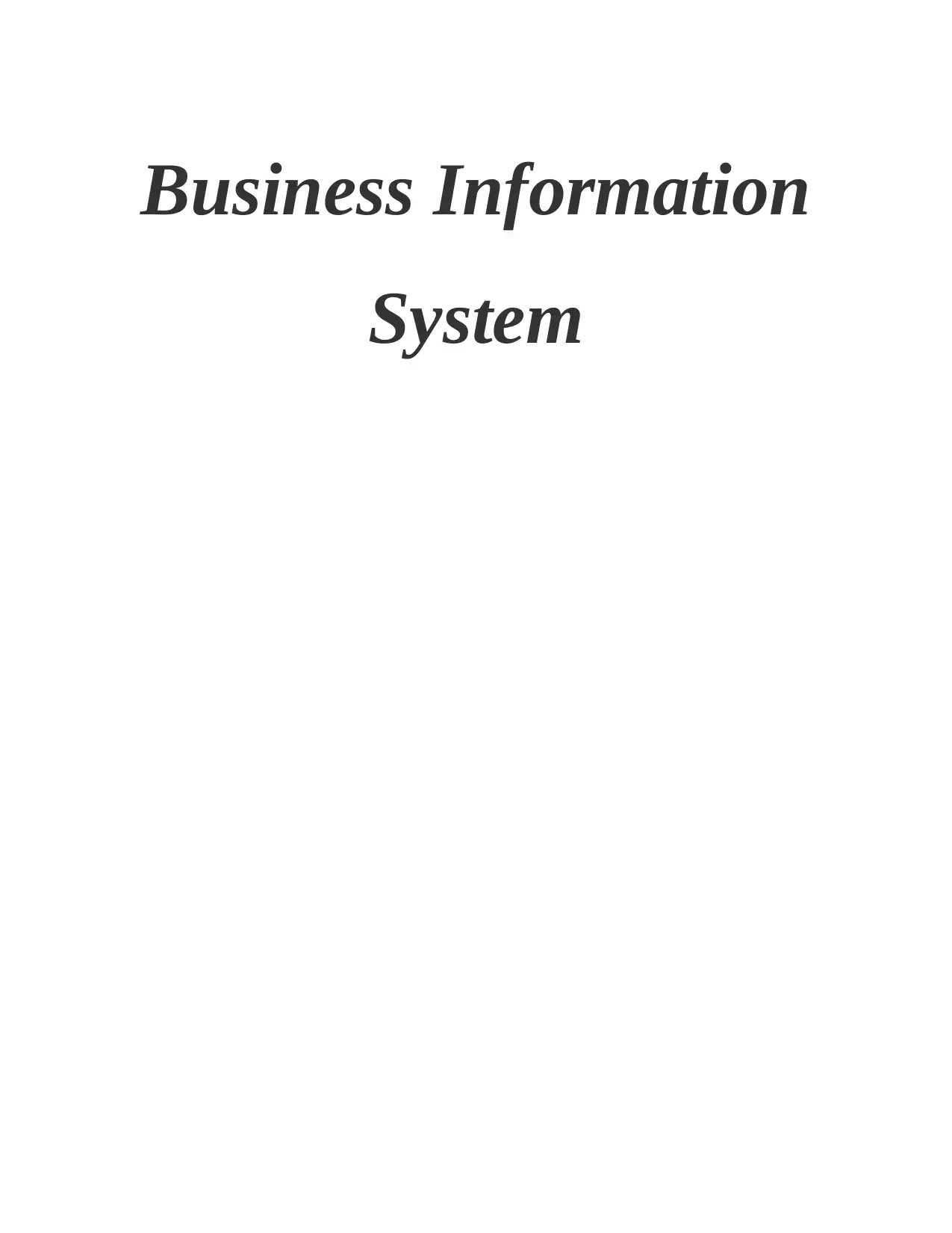
Business Information
System
System
Secure Best Marks with AI Grader
Need help grading? Try our AI Grader for instant feedback on your assignments.
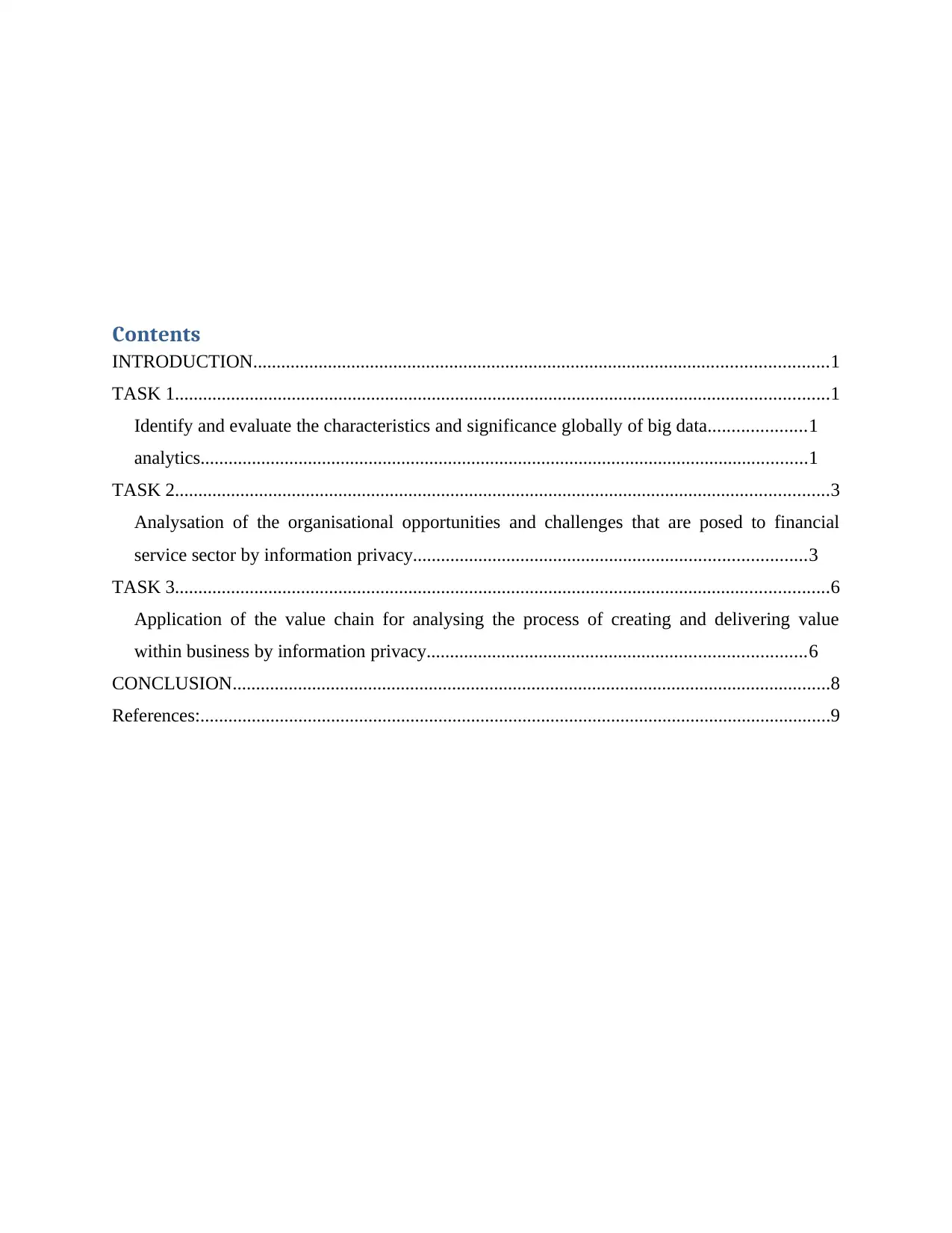
Contents
INTRODUCTION...........................................................................................................................1
TASK 1............................................................................................................................................1
Identify and evaluate the characteristics and significance globally of big data.....................1
analytics..................................................................................................................................1
TASK 2............................................................................................................................................3
Analysation of the organisational opportunities and challenges that are posed to financial
service sector by information privacy....................................................................................3
TASK 3............................................................................................................................................6
Application of the value chain for analysing the process of creating and delivering value
within business by information privacy.................................................................................6
CONCLUSION................................................................................................................................8
References:.......................................................................................................................................9
INTRODUCTION...........................................................................................................................1
TASK 1............................................................................................................................................1
Identify and evaluate the characteristics and significance globally of big data.....................1
analytics..................................................................................................................................1
TASK 2............................................................................................................................................3
Analysation of the organisational opportunities and challenges that are posed to financial
service sector by information privacy....................................................................................3
TASK 3............................................................................................................................................6
Application of the value chain for analysing the process of creating and delivering value
within business by information privacy.................................................................................6
CONCLUSION................................................................................................................................8
References:.......................................................................................................................................9
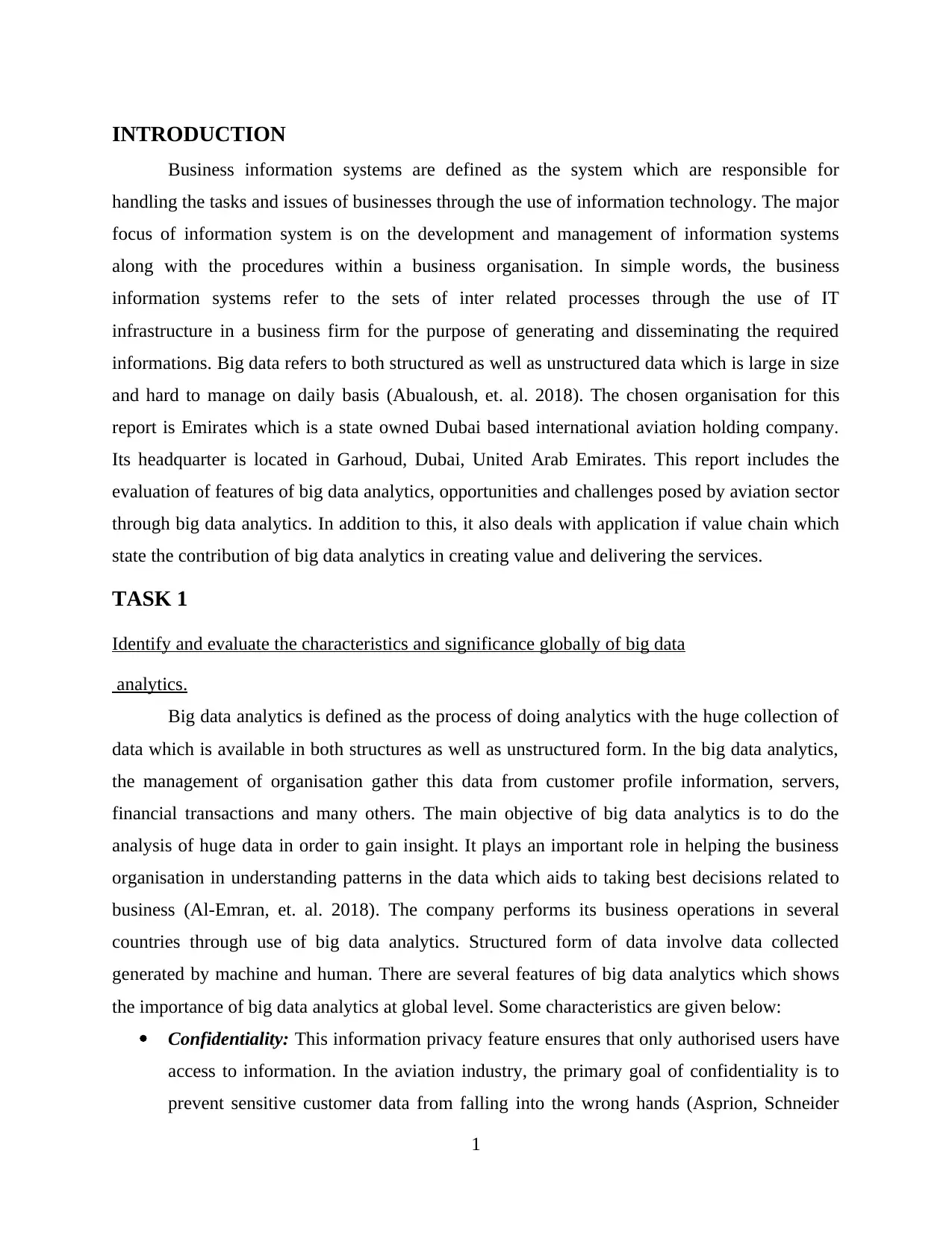
INTRODUCTION
Business information systems are defined as the system which are responsible for
handling the tasks and issues of businesses through the use of information technology. The major
focus of information system is on the development and management of information systems
along with the procedures within a business organisation. In simple words, the business
information systems refer to the sets of inter related processes through the use of IT
infrastructure in a business firm for the purpose of generating and disseminating the required
informations. Big data refers to both structured as well as unstructured data which is large in size
and hard to manage on daily basis (Abualoush, et. al. 2018). The chosen organisation for this
report is Emirates which is a state owned Dubai based international aviation holding company.
Its headquarter is located in Garhoud, Dubai, United Arab Emirates. This report includes the
evaluation of features of big data analytics, opportunities and challenges posed by aviation sector
through big data analytics. In addition to this, it also deals with application if value chain which
state the contribution of big data analytics in creating value and delivering the services.
TASK 1
Identify and evaluate the characteristics and significance globally of big data
analytics.
Big data analytics is defined as the process of doing analytics with the huge collection of
data which is available in both structures as well as unstructured form. In the big data analytics,
the management of organisation gather this data from customer profile information, servers,
financial transactions and many others. The main objective of big data analytics is to do the
analysis of huge data in order to gain insight. It plays an important role in helping the business
organisation in understanding patterns in the data which aids to taking best decisions related to
business (Al-Emran, et. al. 2018). The company performs its business operations in several
countries through use of big data analytics. Structured form of data involve data collected
generated by machine and human. There are several features of big data analytics which shows
the importance of big data analytics at global level. Some characteristics are given below:
Confidentiality: This information privacy feature ensures that only authorised users have
access to information. In the aviation industry, the primary goal of confidentiality is to
prevent sensitive customer data from falling into the wrong hands (Asprion, Schneider
1
Business information systems are defined as the system which are responsible for
handling the tasks and issues of businesses through the use of information technology. The major
focus of information system is on the development and management of information systems
along with the procedures within a business organisation. In simple words, the business
information systems refer to the sets of inter related processes through the use of IT
infrastructure in a business firm for the purpose of generating and disseminating the required
informations. Big data refers to both structured as well as unstructured data which is large in size
and hard to manage on daily basis (Abualoush, et. al. 2018). The chosen organisation for this
report is Emirates which is a state owned Dubai based international aviation holding company.
Its headquarter is located in Garhoud, Dubai, United Arab Emirates. This report includes the
evaluation of features of big data analytics, opportunities and challenges posed by aviation sector
through big data analytics. In addition to this, it also deals with application if value chain which
state the contribution of big data analytics in creating value and delivering the services.
TASK 1
Identify and evaluate the characteristics and significance globally of big data
analytics.
Big data analytics is defined as the process of doing analytics with the huge collection of
data which is available in both structures as well as unstructured form. In the big data analytics,
the management of organisation gather this data from customer profile information, servers,
financial transactions and many others. The main objective of big data analytics is to do the
analysis of huge data in order to gain insight. It plays an important role in helping the business
organisation in understanding patterns in the data which aids to taking best decisions related to
business (Al-Emran, et. al. 2018). The company performs its business operations in several
countries through use of big data analytics. Structured form of data involve data collected
generated by machine and human. There are several features of big data analytics which shows
the importance of big data analytics at global level. Some characteristics are given below:
Confidentiality: This information privacy feature ensures that only authorised users have
access to information. In the aviation industry, the primary goal of confidentiality is to
prevent sensitive customer data from falling into the wrong hands (Asprion, Schneider
1
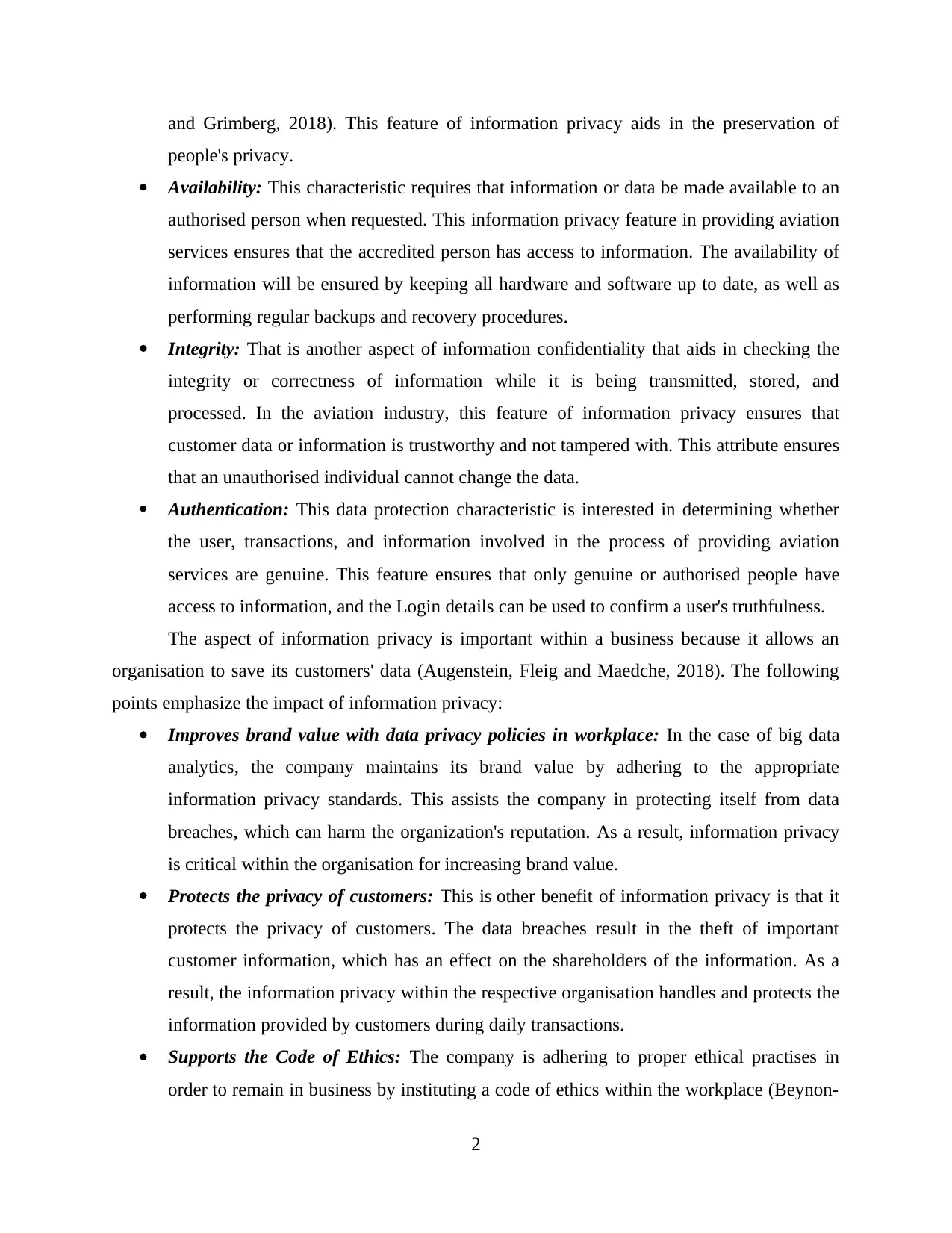
and Grimberg, 2018). This feature of information privacy aids in the preservation of
people's privacy.
Availability: This characteristic requires that information or data be made available to an
authorised person when requested. This information privacy feature in providing aviation
services ensures that the accredited person has access to information. The availability of
information will be ensured by keeping all hardware and software up to date, as well as
performing regular backups and recovery procedures.
Integrity: That is another aspect of information confidentiality that aids in checking the
integrity or correctness of information while it is being transmitted, stored, and
processed. In the aviation industry, this feature of information privacy ensures that
customer data or information is trustworthy and not tampered with. This attribute ensures
that an unauthorised individual cannot change the data.
Authentication: This data protection characteristic is interested in determining whether
the user, transactions, and information involved in the process of providing aviation
services are genuine. This feature ensures that only genuine or authorised people have
access to information, and the Login details can be used to confirm a user's truthfulness.
The aspect of information privacy is important within a business because it allows an
organisation to save its customers' data (Augenstein, Fleig and Maedche, 2018). The following
points emphasize the impact of information privacy:
Improves brand value with data privacy policies in workplace: In the case of big data
analytics, the company maintains its brand value by adhering to the appropriate
information privacy standards. This assists the company in protecting itself from data
breaches, which can harm the organization's reputation. As a result, information privacy
is critical within the organisation for increasing brand value.
Protects the privacy of customers: This is other benefit of information privacy is that it
protects the privacy of customers. The data breaches result in the theft of important
customer information, which has an effect on the shareholders of the information. As a
result, the information privacy within the respective organisation handles and protects the
information provided by customers during daily transactions.
Supports the Code of Ethics: The company is adhering to proper ethical practises in
order to remain in business by instituting a code of ethics within the workplace (Beynon-
2
people's privacy.
Availability: This characteristic requires that information or data be made available to an
authorised person when requested. This information privacy feature in providing aviation
services ensures that the accredited person has access to information. The availability of
information will be ensured by keeping all hardware and software up to date, as well as
performing regular backups and recovery procedures.
Integrity: That is another aspect of information confidentiality that aids in checking the
integrity or correctness of information while it is being transmitted, stored, and
processed. In the aviation industry, this feature of information privacy ensures that
customer data or information is trustworthy and not tampered with. This attribute ensures
that an unauthorised individual cannot change the data.
Authentication: This data protection characteristic is interested in determining whether
the user, transactions, and information involved in the process of providing aviation
services are genuine. This feature ensures that only genuine or authorised people have
access to information, and the Login details can be used to confirm a user's truthfulness.
The aspect of information privacy is important within a business because it allows an
organisation to save its customers' data (Augenstein, Fleig and Maedche, 2018). The following
points emphasize the impact of information privacy:
Improves brand value with data privacy policies in workplace: In the case of big data
analytics, the company maintains its brand value by adhering to the appropriate
information privacy standards. This assists the company in protecting itself from data
breaches, which can harm the organization's reputation. As a result, information privacy
is critical within the organisation for increasing brand value.
Protects the privacy of customers: This is other benefit of information privacy is that it
protects the privacy of customers. The data breaches result in the theft of important
customer information, which has an effect on the shareholders of the information. As a
result, the information privacy within the respective organisation handles and protects the
information provided by customers during daily transactions.
Supports the Code of Ethics: The company is adhering to proper ethical practises in
order to remain in business by instituting a code of ethics within the workplace (Beynon-
2
Secure Best Marks with AI Grader
Need help grading? Try our AI Grader for instant feedback on your assignments.
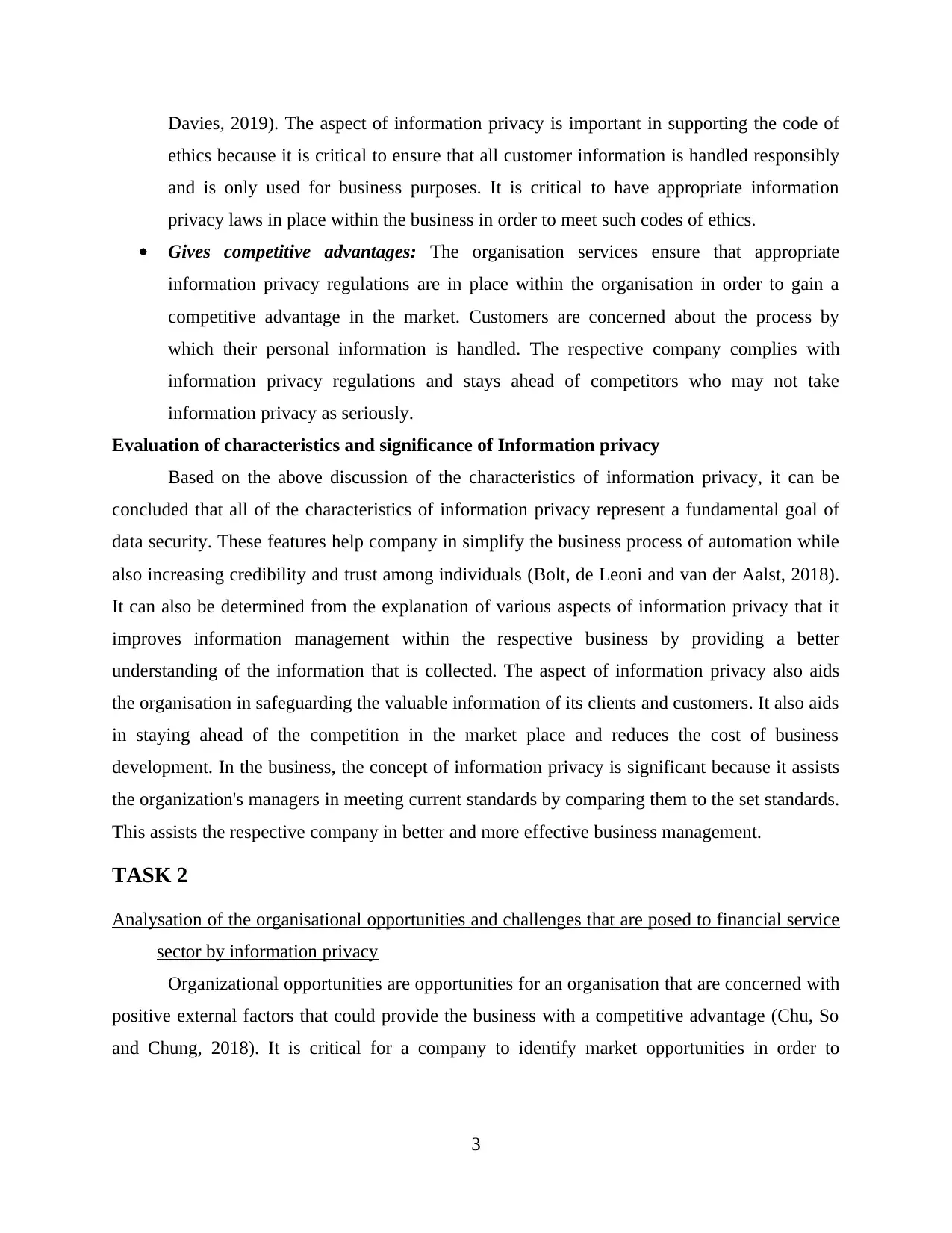
Davies, 2019). The aspect of information privacy is important in supporting the code of
ethics because it is critical to ensure that all customer information is handled responsibly
and is only used for business purposes. It is critical to have appropriate information
privacy laws in place within the business in order to meet such codes of ethics.
Gives competitive advantages: The organisation services ensure that appropriate
information privacy regulations are in place within the organisation in order to gain a
competitive advantage in the market. Customers are concerned about the process by
which their personal information is handled. The respective company complies with
information privacy regulations and stays ahead of competitors who may not take
information privacy as seriously.
Evaluation of characteristics and significance of Information privacy
Based on the above discussion of the characteristics of information privacy, it can be
concluded that all of the characteristics of information privacy represent a fundamental goal of
data security. These features help company in simplify the business process of automation while
also increasing credibility and trust among individuals (Bolt, de Leoni and van der Aalst, 2018).
It can also be determined from the explanation of various aspects of information privacy that it
improves information management within the respective business by providing a better
understanding of the information that is collected. The aspect of information privacy also aids
the organisation in safeguarding the valuable information of its clients and customers. It also aids
in staying ahead of the competition in the market place and reduces the cost of business
development. In the business, the concept of information privacy is significant because it assists
the organization's managers in meeting current standards by comparing them to the set standards.
This assists the respective company in better and more effective business management.
TASK 2
Analysation of the organisational opportunities and challenges that are posed to financial service
sector by information privacy
Organizational opportunities are opportunities for an organisation that are concerned with
positive external factors that could provide the business with a competitive advantage (Chu, So
and Chung, 2018). It is critical for a company to identify market opportunities in order to
3
ethics because it is critical to ensure that all customer information is handled responsibly
and is only used for business purposes. It is critical to have appropriate information
privacy laws in place within the business in order to meet such codes of ethics.
Gives competitive advantages: The organisation services ensure that appropriate
information privacy regulations are in place within the organisation in order to gain a
competitive advantage in the market. Customers are concerned about the process by
which their personal information is handled. The respective company complies with
information privacy regulations and stays ahead of competitors who may not take
information privacy as seriously.
Evaluation of characteristics and significance of Information privacy
Based on the above discussion of the characteristics of information privacy, it can be
concluded that all of the characteristics of information privacy represent a fundamental goal of
data security. These features help company in simplify the business process of automation while
also increasing credibility and trust among individuals (Bolt, de Leoni and van der Aalst, 2018).
It can also be determined from the explanation of various aspects of information privacy that it
improves information management within the respective business by providing a better
understanding of the information that is collected. The aspect of information privacy also aids
the organisation in safeguarding the valuable information of its clients and customers. It also aids
in staying ahead of the competition in the market place and reduces the cost of business
development. In the business, the concept of information privacy is significant because it assists
the organization's managers in meeting current standards by comparing them to the set standards.
This assists the respective company in better and more effective business management.
TASK 2
Analysation of the organisational opportunities and challenges that are posed to financial service
sector by information privacy
Organizational opportunities are opportunities for an organisation that are concerned with
positive external factors that could provide the business with a competitive advantage (Chu, So
and Chung, 2018). It is critical for a company to identify market opportunities in order to
3
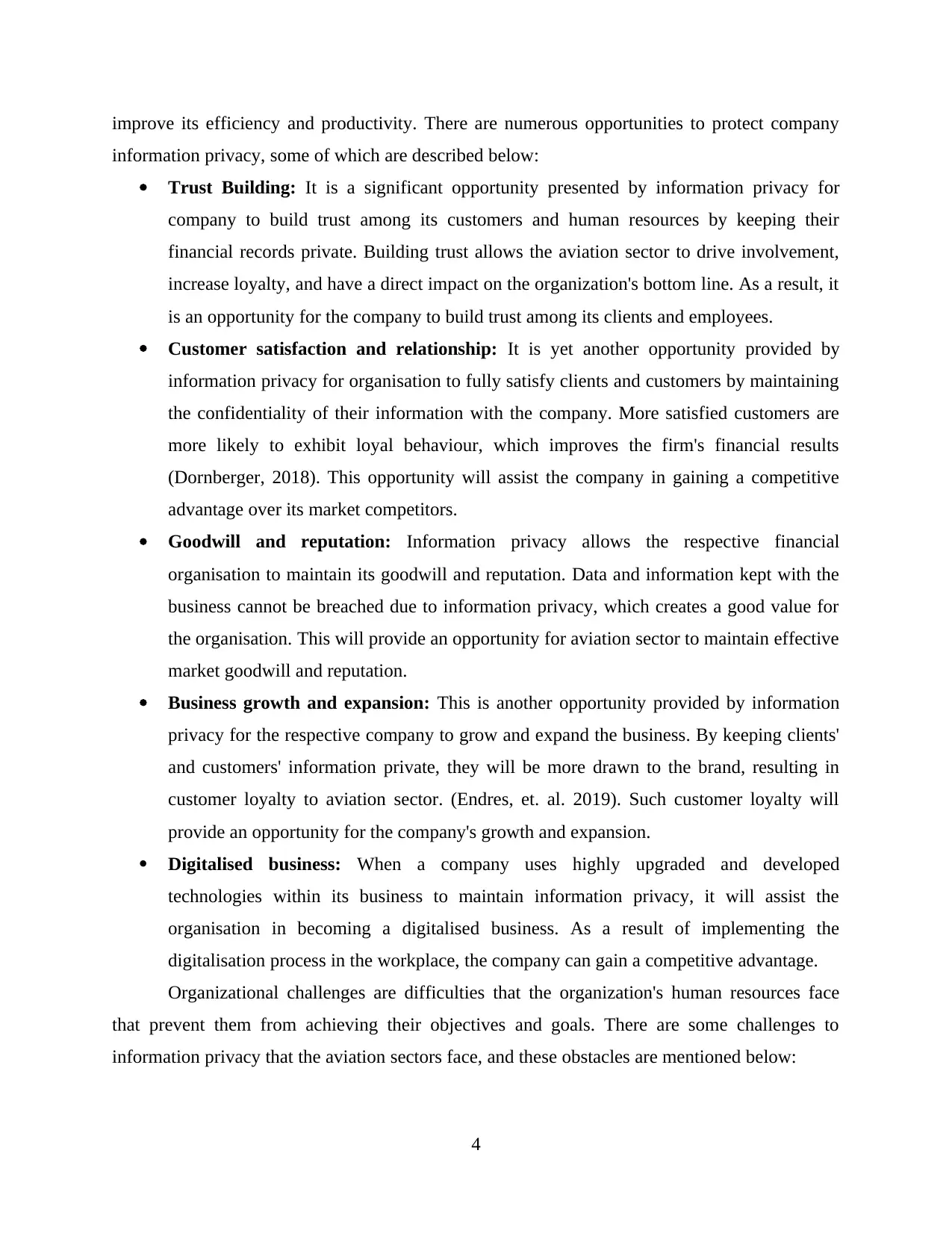
improve its efficiency and productivity. There are numerous opportunities to protect company
information privacy, some of which are described below:
Trust Building: It is a significant opportunity presented by information privacy for
company to build trust among its customers and human resources by keeping their
financial records private. Building trust allows the aviation sector to drive involvement,
increase loyalty, and have a direct impact on the organization's bottom line. As a result, it
is an opportunity for the company to build trust among its clients and employees.
Customer satisfaction and relationship: It is yet another opportunity provided by
information privacy for organisation to fully satisfy clients and customers by maintaining
the confidentiality of their information with the company. More satisfied customers are
more likely to exhibit loyal behaviour, which improves the firm's financial results
(Dornberger, 2018). This opportunity will assist the company in gaining a competitive
advantage over its market competitors.
Goodwill and reputation: Information privacy allows the respective financial
organisation to maintain its goodwill and reputation. Data and information kept with the
business cannot be breached due to information privacy, which creates a good value for
the organisation. This will provide an opportunity for aviation sector to maintain effective
market goodwill and reputation.
Business growth and expansion: This is another opportunity provided by information
privacy for the respective company to grow and expand the business. By keeping clients'
and customers' information private, they will be more drawn to the brand, resulting in
customer loyalty to aviation sector. (Endres, et. al. 2019). Such customer loyalty will
provide an opportunity for the company's growth and expansion.
Digitalised business: When a company uses highly upgraded and developed
technologies within its business to maintain information privacy, it will assist the
organisation in becoming a digitalised business. As a result of implementing the
digitalisation process in the workplace, the company can gain a competitive advantage.
Organizational challenges are difficulties that the organization's human resources face
that prevent them from achieving their objectives and goals. There are some challenges to
information privacy that the aviation sectors face, and these obstacles are mentioned below:
4
information privacy, some of which are described below:
Trust Building: It is a significant opportunity presented by information privacy for
company to build trust among its customers and human resources by keeping their
financial records private. Building trust allows the aviation sector to drive involvement,
increase loyalty, and have a direct impact on the organization's bottom line. As a result, it
is an opportunity for the company to build trust among its clients and employees.
Customer satisfaction and relationship: It is yet another opportunity provided by
information privacy for organisation to fully satisfy clients and customers by maintaining
the confidentiality of their information with the company. More satisfied customers are
more likely to exhibit loyal behaviour, which improves the firm's financial results
(Dornberger, 2018). This opportunity will assist the company in gaining a competitive
advantage over its market competitors.
Goodwill and reputation: Information privacy allows the respective financial
organisation to maintain its goodwill and reputation. Data and information kept with the
business cannot be breached due to information privacy, which creates a good value for
the organisation. This will provide an opportunity for aviation sector to maintain effective
market goodwill and reputation.
Business growth and expansion: This is another opportunity provided by information
privacy for the respective company to grow and expand the business. By keeping clients'
and customers' information private, they will be more drawn to the brand, resulting in
customer loyalty to aviation sector. (Endres, et. al. 2019). Such customer loyalty will
provide an opportunity for the company's growth and expansion.
Digitalised business: When a company uses highly upgraded and developed
technologies within its business to maintain information privacy, it will assist the
organisation in becoming a digitalised business. As a result of implementing the
digitalisation process in the workplace, the company can gain a competitive advantage.
Organizational challenges are difficulties that the organization's human resources face
that prevent them from achieving their objectives and goals. There are some challenges to
information privacy that the aviation sectors face, and these obstacles are mentioned below:
4
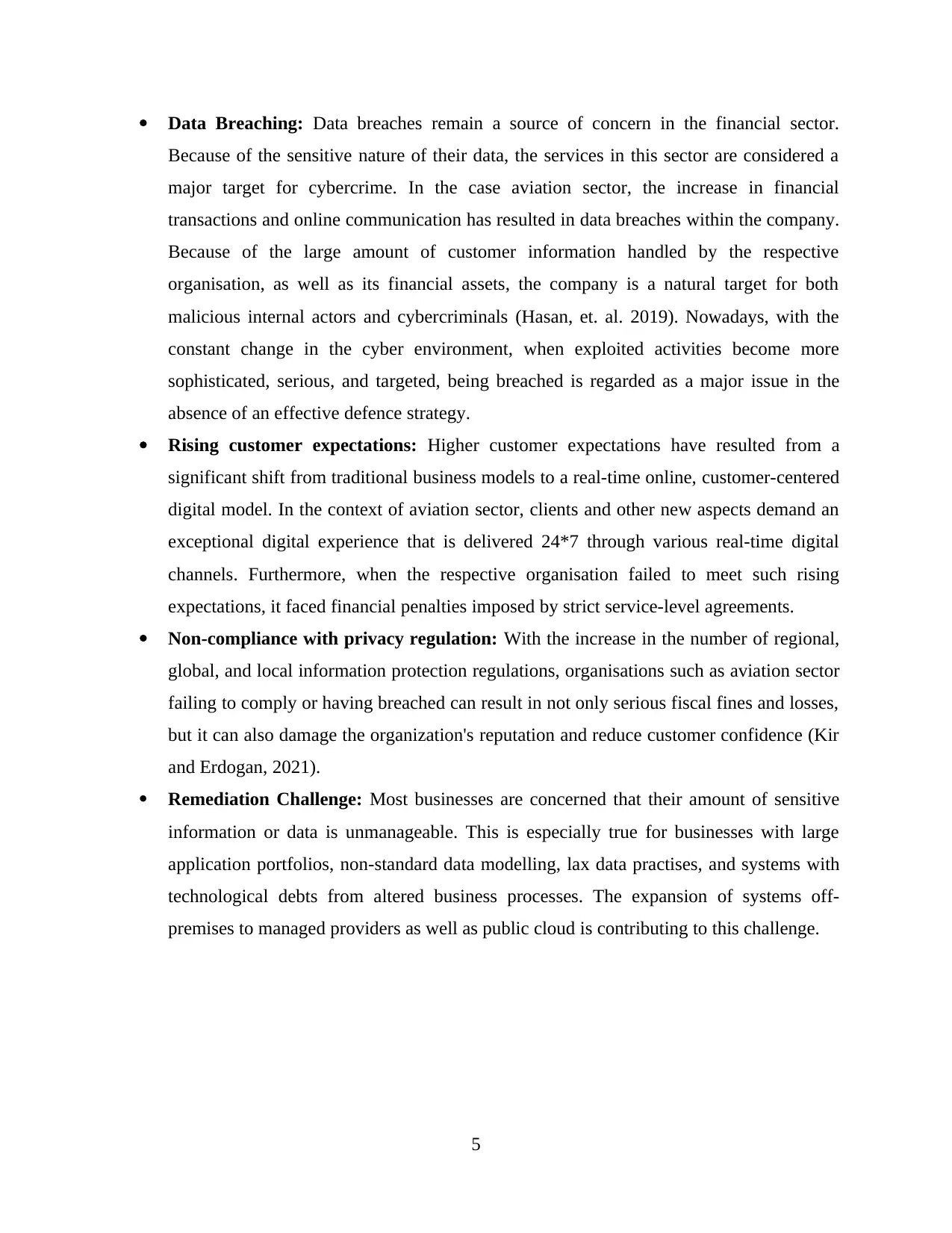
Data Breaching: Data breaches remain a source of concern in the financial sector.
Because of the sensitive nature of their data, the services in this sector are considered a
major target for cybercrime. In the case aviation sector, the increase in financial
transactions and online communication has resulted in data breaches within the company.
Because of the large amount of customer information handled by the respective
organisation, as well as its financial assets, the company is a natural target for both
malicious internal actors and cybercriminals (Hasan, et. al. 2019). Nowadays, with the
constant change in the cyber environment, when exploited activities become more
sophisticated, serious, and targeted, being breached is regarded as a major issue in the
absence of an effective defence strategy.
Rising customer expectations: Higher customer expectations have resulted from a
significant shift from traditional business models to a real-time online, customer-centered
digital model. In the context of aviation sector, clients and other new aspects demand an
exceptional digital experience that is delivered 24*7 through various real-time digital
channels. Furthermore, when the respective organisation failed to meet such rising
expectations, it faced financial penalties imposed by strict service-level agreements.
Non-compliance with privacy regulation: With the increase in the number of regional,
global, and local information protection regulations, organisations such as aviation sector
failing to comply or having breached can result in not only serious fiscal fines and losses,
but it can also damage the organization's reputation and reduce customer confidence (Kir
and Erdogan, 2021).
Remediation Challenge: Most businesses are concerned that their amount of sensitive
information or data is unmanageable. This is especially true for businesses with large
application portfolios, non-standard data modelling, lax data practises, and systems with
technological debts from altered business processes. The expansion of systems off-
premises to managed providers as well as public cloud is contributing to this challenge.
5
Because of the sensitive nature of their data, the services in this sector are considered a
major target for cybercrime. In the case aviation sector, the increase in financial
transactions and online communication has resulted in data breaches within the company.
Because of the large amount of customer information handled by the respective
organisation, as well as its financial assets, the company is a natural target for both
malicious internal actors and cybercriminals (Hasan, et. al. 2019). Nowadays, with the
constant change in the cyber environment, when exploited activities become more
sophisticated, serious, and targeted, being breached is regarded as a major issue in the
absence of an effective defence strategy.
Rising customer expectations: Higher customer expectations have resulted from a
significant shift from traditional business models to a real-time online, customer-centered
digital model. In the context of aviation sector, clients and other new aspects demand an
exceptional digital experience that is delivered 24*7 through various real-time digital
channels. Furthermore, when the respective organisation failed to meet such rising
expectations, it faced financial penalties imposed by strict service-level agreements.
Non-compliance with privacy regulation: With the increase in the number of regional,
global, and local information protection regulations, organisations such as aviation sector
failing to comply or having breached can result in not only serious fiscal fines and losses,
but it can also damage the organization's reputation and reduce customer confidence (Kir
and Erdogan, 2021).
Remediation Challenge: Most businesses are concerned that their amount of sensitive
information or data is unmanageable. This is especially true for businesses with large
application portfolios, non-standard data modelling, lax data practises, and systems with
technological debts from altered business processes. The expansion of systems off-
premises to managed providers as well as public cloud is contributing to this challenge.
5
Paraphrase This Document
Need a fresh take? Get an instant paraphrase of this document with our AI Paraphraser
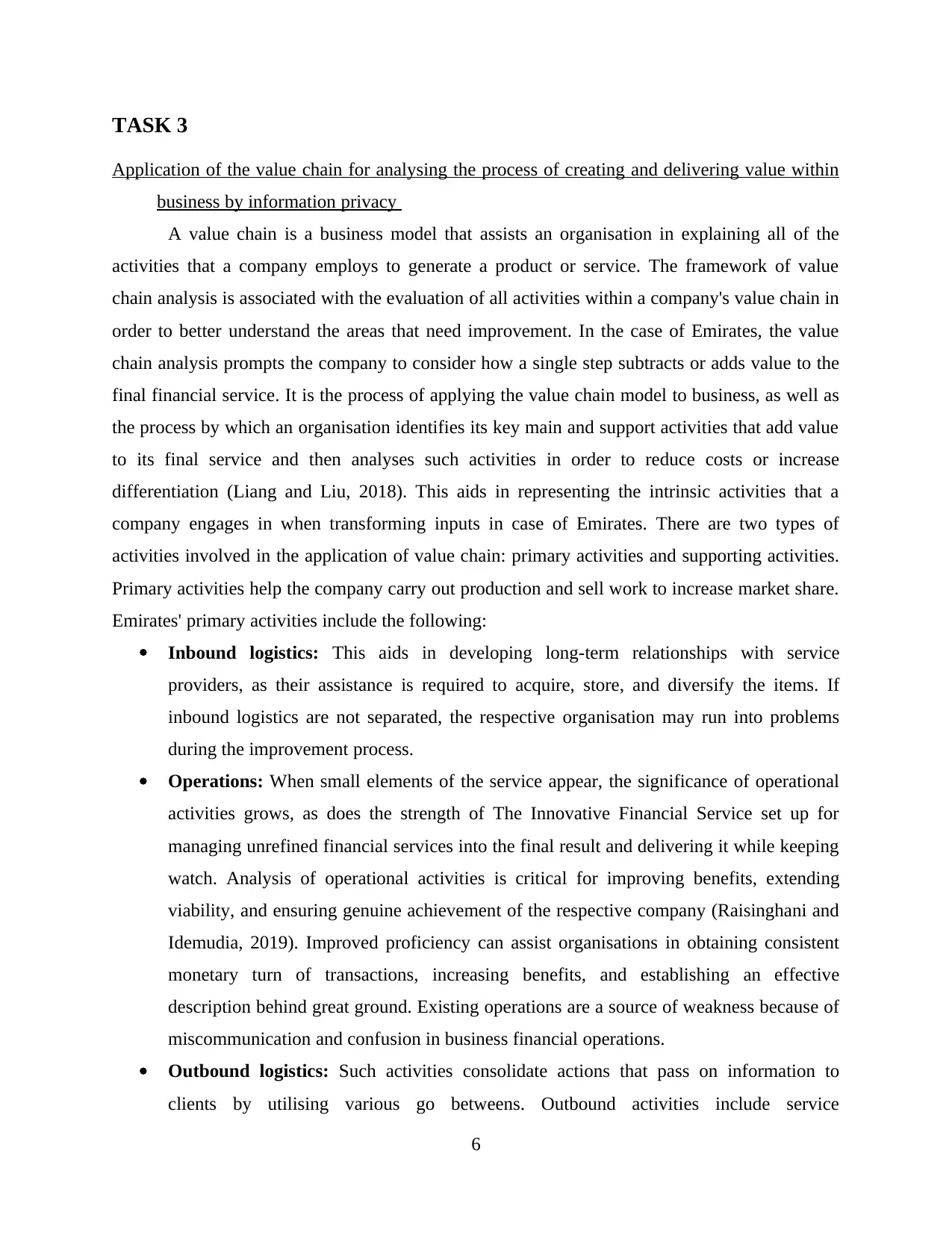
TASK 3
Application of the value chain for analysing the process of creating and delivering value within
business by information privacy
A value chain is a business model that assists an organisation in explaining all of the
activities that a company employs to generate a product or service. The framework of value
chain analysis is associated with the evaluation of all activities within a company's value chain in
order to better understand the areas that need improvement. In the case of Emirates, the value
chain analysis prompts the company to consider how a single step subtracts or adds value to the
final financial service. It is the process of applying the value chain model to business, as well as
the process by which an organisation identifies its key main and support activities that add value
to its final service and then analyses such activities in order to reduce costs or increase
differentiation (Liang and Liu, 2018). This aids in representing the intrinsic activities that a
company engages in when transforming inputs in case of Emirates. There are two types of
activities involved in the application of value chain: primary activities and supporting activities.
Primary activities help the company carry out production and sell work to increase market share.
Emirates' primary activities include the following:
Inbound logistics: This aids in developing long-term relationships with service
providers, as their assistance is required to acquire, store, and diversify the items. If
inbound logistics are not separated, the respective organisation may run into problems
during the improvement process.
Operations: When small elements of the service appear, the significance of operational
activities grows, as does the strength of The Innovative Financial Service set up for
managing unrefined financial services into the final result and delivering it while keeping
watch. Analysis of operational activities is critical for improving benefits, extending
viability, and ensuring genuine achievement of the respective company (Raisinghani and
Idemudia, 2019). Improved proficiency can assist organisations in obtaining consistent
monetary turn of transactions, increasing benefits, and establishing an effective
description behind great ground. Existing operations are a source of weakness because of
miscommunication and confusion in business financial operations.
Outbound logistics: Such activities consolidate actions that pass on information to
clients by utilising various go betweens. Outbound activities include service
6
Application of the value chain for analysing the process of creating and delivering value within
business by information privacy
A value chain is a business model that assists an organisation in explaining all of the
activities that a company employs to generate a product or service. The framework of value
chain analysis is associated with the evaluation of all activities within a company's value chain in
order to better understand the areas that need improvement. In the case of Emirates, the value
chain analysis prompts the company to consider how a single step subtracts or adds value to the
final financial service. It is the process of applying the value chain model to business, as well as
the process by which an organisation identifies its key main and support activities that add value
to its final service and then analyses such activities in order to reduce costs or increase
differentiation (Liang and Liu, 2018). This aids in representing the intrinsic activities that a
company engages in when transforming inputs in case of Emirates. There are two types of
activities involved in the application of value chain: primary activities and supporting activities.
Primary activities help the company carry out production and sell work to increase market share.
Emirates' primary activities include the following:
Inbound logistics: This aids in developing long-term relationships with service
providers, as their assistance is required to acquire, store, and diversify the items. If
inbound logistics are not separated, the respective organisation may run into problems
during the improvement process.
Operations: When small elements of the service appear, the significance of operational
activities grows, as does the strength of The Innovative Financial Service set up for
managing unrefined financial services into the final result and delivering it while keeping
watch. Analysis of operational activities is critical for improving benefits, extending
viability, and ensuring genuine achievement of the respective company (Raisinghani and
Idemudia, 2019). Improved proficiency can assist organisations in obtaining consistent
monetary turn of transactions, increasing benefits, and establishing an effective
description behind great ground. Existing operations are a source of weakness because of
miscommunication and confusion in business financial operations.
Outbound logistics: Such activities consolidate actions that pass on information to
clients by utilising various go betweens. Outbound activities include service
6
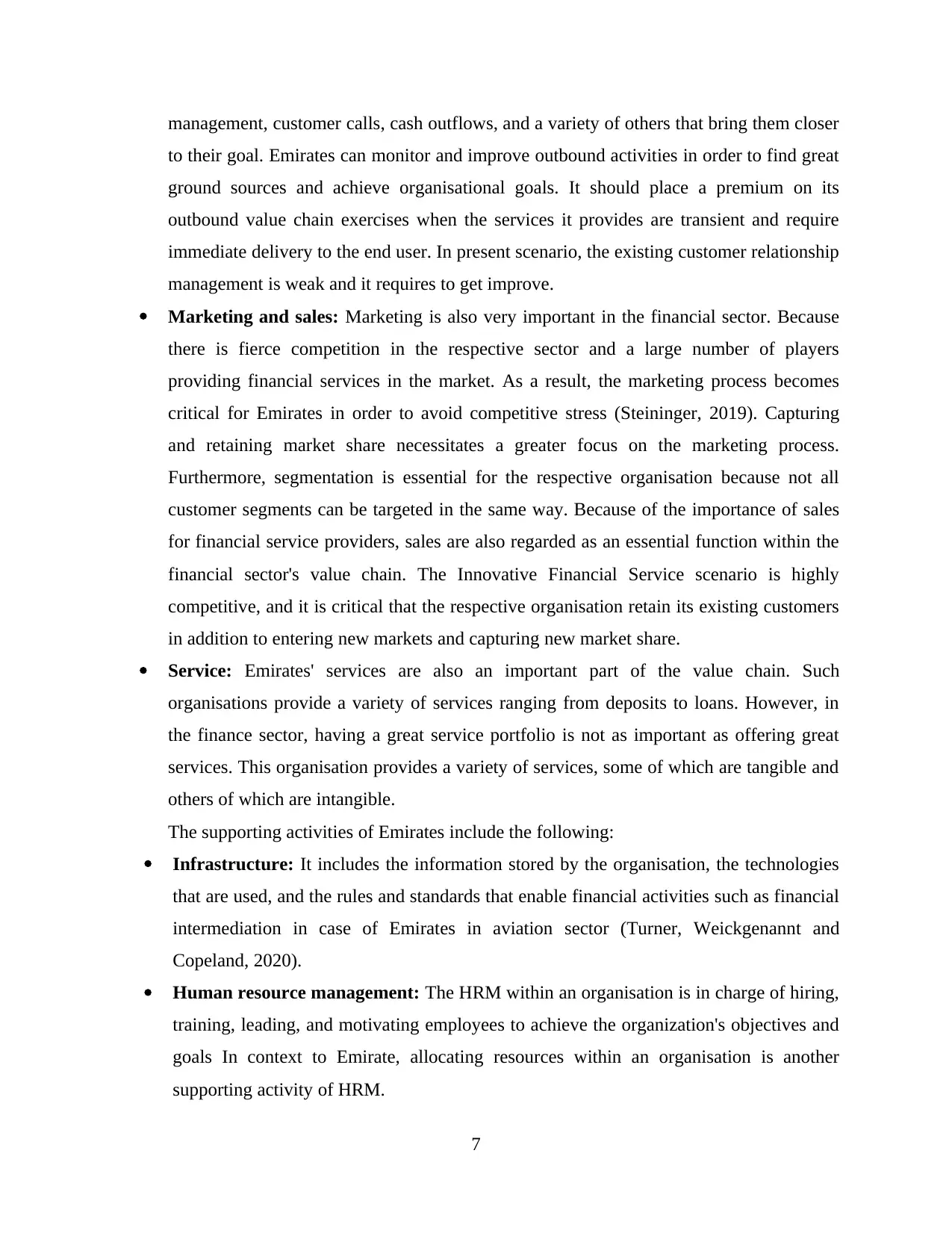
management, customer calls, cash outflows, and a variety of others that bring them closer
to their goal. Emirates can monitor and improve outbound activities in order to find great
ground sources and achieve organisational goals. It should place a premium on its
outbound value chain exercises when the services it provides are transient and require
immediate delivery to the end user. In present scenario, the existing customer relationship
management is weak and it requires to get improve.
Marketing and sales: Marketing is also very important in the financial sector. Because
there is fierce competition in the respective sector and a large number of players
providing financial services in the market. As a result, the marketing process becomes
critical for Emirates in order to avoid competitive stress (Steininger, 2019). Capturing
and retaining market share necessitates a greater focus on the marketing process.
Furthermore, segmentation is essential for the respective organisation because not all
customer segments can be targeted in the same way. Because of the importance of sales
for financial service providers, sales are also regarded as an essential function within the
financial sector's value chain. The Innovative Financial Service scenario is highly
competitive, and it is critical that the respective organisation retain its existing customers
in addition to entering new markets and capturing new market share.
Service: Emirates' services are also an important part of the value chain. Such
organisations provide a variety of services ranging from deposits to loans. However, in
the finance sector, having a great service portfolio is not as important as offering great
services. This organisation provides a variety of services, some of which are tangible and
others of which are intangible.
The supporting activities of Emirates include the following:
Infrastructure: It includes the information stored by the organisation, the technologies
that are used, and the rules and standards that enable financial activities such as financial
intermediation in case of Emirates in aviation sector (Turner, Weickgenannt and
Copeland, 2020).
Human resource management: The HRM within an organisation is in charge of hiring,
training, leading, and motivating employees to achieve the organization's objectives and
goals In context to Emirate, allocating resources within an organisation is another
supporting activity of HRM.
7
to their goal. Emirates can monitor and improve outbound activities in order to find great
ground sources and achieve organisational goals. It should place a premium on its
outbound value chain exercises when the services it provides are transient and require
immediate delivery to the end user. In present scenario, the existing customer relationship
management is weak and it requires to get improve.
Marketing and sales: Marketing is also very important in the financial sector. Because
there is fierce competition in the respective sector and a large number of players
providing financial services in the market. As a result, the marketing process becomes
critical for Emirates in order to avoid competitive stress (Steininger, 2019). Capturing
and retaining market share necessitates a greater focus on the marketing process.
Furthermore, segmentation is essential for the respective organisation because not all
customer segments can be targeted in the same way. Because of the importance of sales
for financial service providers, sales are also regarded as an essential function within the
financial sector's value chain. The Innovative Financial Service scenario is highly
competitive, and it is critical that the respective organisation retain its existing customers
in addition to entering new markets and capturing new market share.
Service: Emirates' services are also an important part of the value chain. Such
organisations provide a variety of services ranging from deposits to loans. However, in
the finance sector, having a great service portfolio is not as important as offering great
services. This organisation provides a variety of services, some of which are tangible and
others of which are intangible.
The supporting activities of Emirates include the following:
Infrastructure: It includes the information stored by the organisation, the technologies
that are used, and the rules and standards that enable financial activities such as financial
intermediation in case of Emirates in aviation sector (Turner, Weickgenannt and
Copeland, 2020).
Human resource management: The HRM within an organisation is in charge of hiring,
training, leading, and motivating employees to achieve the organization's objectives and
goals In context to Emirate, allocating resources within an organisation is another
supporting activity of HRM.
7
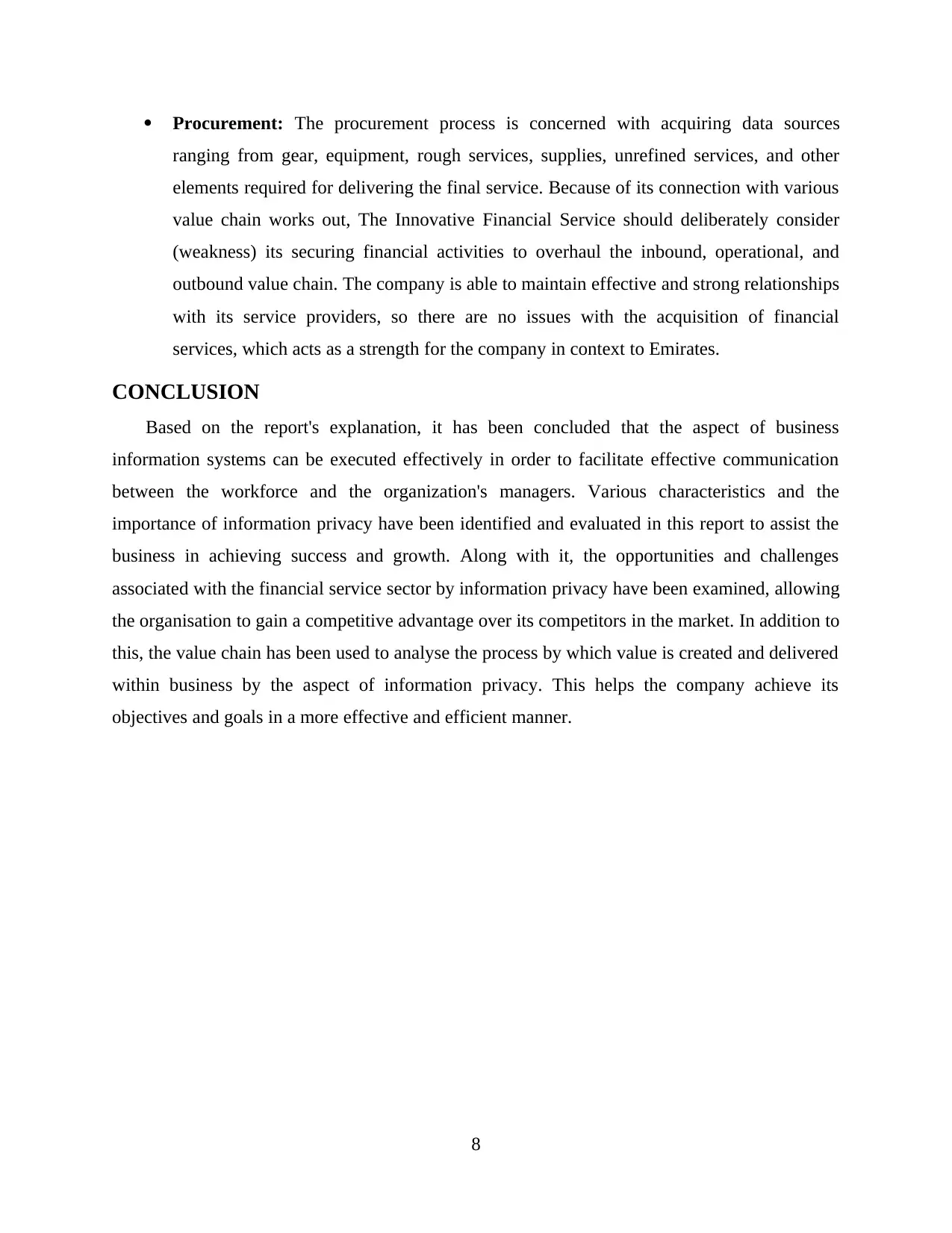
Procurement: The procurement process is concerned with acquiring data sources
ranging from gear, equipment, rough services, supplies, unrefined services, and other
elements required for delivering the final service. Because of its connection with various
value chain works out, The Innovative Financial Service should deliberately consider
(weakness) its securing financial activities to overhaul the inbound, operational, and
outbound value chain. The company is able to maintain effective and strong relationships
with its service providers, so there are no issues with the acquisition of financial
services, which acts as a strength for the company in context to Emirates.
CONCLUSION
Based on the report's explanation, it has been concluded that the aspect of business
information systems can be executed effectively in order to facilitate effective communication
between the workforce and the organization's managers. Various characteristics and the
importance of information privacy have been identified and evaluated in this report to assist the
business in achieving success and growth. Along with it, the opportunities and challenges
associated with the financial service sector by information privacy have been examined, allowing
the organisation to gain a competitive advantage over its competitors in the market. In addition to
this, the value chain has been used to analyse the process by which value is created and delivered
within business by the aspect of information privacy. This helps the company achieve its
objectives and goals in a more effective and efficient manner.
8
ranging from gear, equipment, rough services, supplies, unrefined services, and other
elements required for delivering the final service. Because of its connection with various
value chain works out, The Innovative Financial Service should deliberately consider
(weakness) its securing financial activities to overhaul the inbound, operational, and
outbound value chain. The company is able to maintain effective and strong relationships
with its service providers, so there are no issues with the acquisition of financial
services, which acts as a strength for the company in context to Emirates.
CONCLUSION
Based on the report's explanation, it has been concluded that the aspect of business
information systems can be executed effectively in order to facilitate effective communication
between the workforce and the organization's managers. Various characteristics and the
importance of information privacy have been identified and evaluated in this report to assist the
business in achieving success and growth. Along with it, the opportunities and challenges
associated with the financial service sector by information privacy have been examined, allowing
the organisation to gain a competitive advantage over its competitors in the market. In addition to
this, the value chain has been used to analyse the process by which value is created and delivered
within business by the aspect of information privacy. This helps the company achieve its
objectives and goals in a more effective and efficient manner.
8
Secure Best Marks with AI Grader
Need help grading? Try our AI Grader for instant feedback on your assignments.
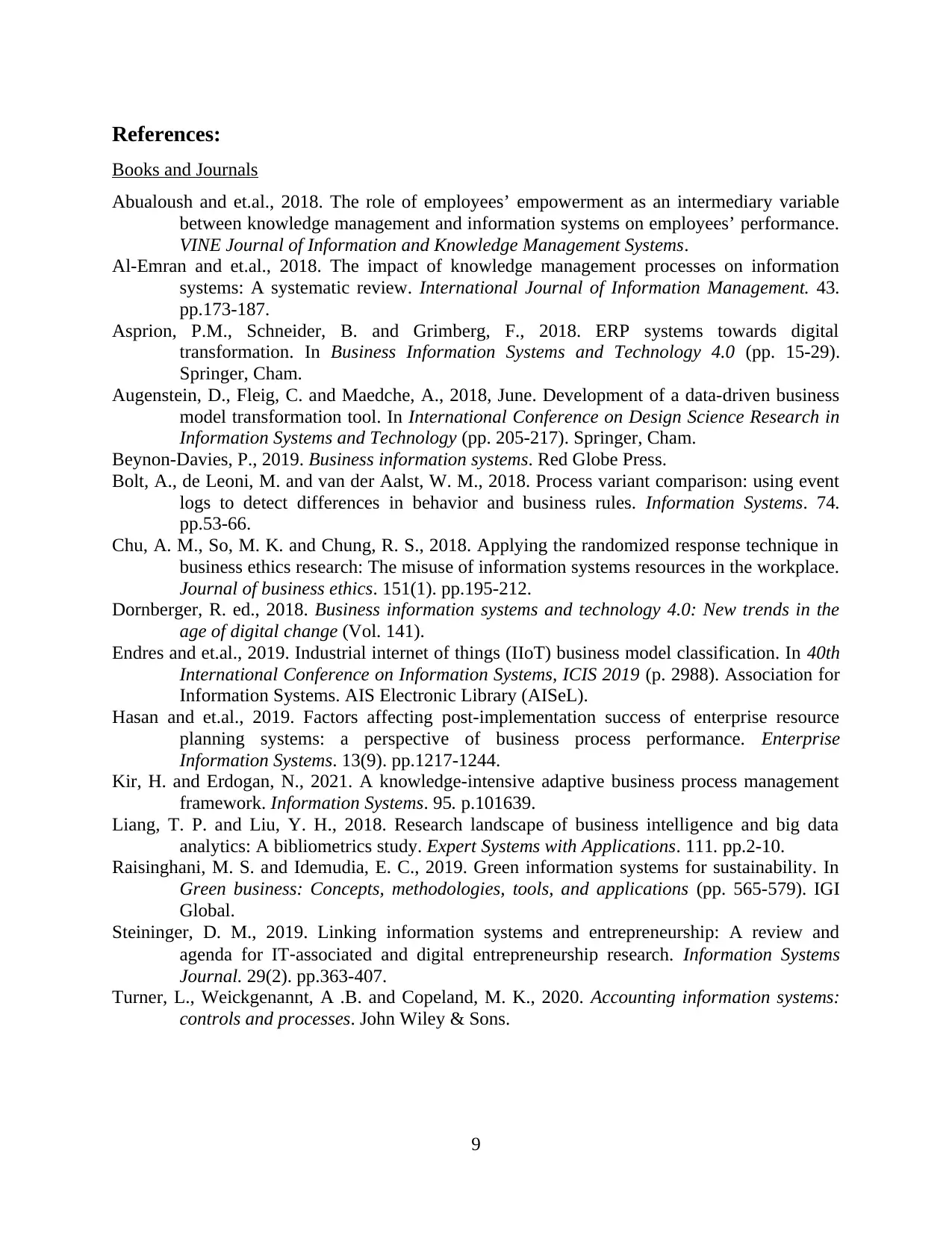
References:
Books and Journals
Abualoush and et.al., 2018. The role of employees’ empowerment as an intermediary variable
between knowledge management and information systems on employees’ performance.
VINE Journal of Information and Knowledge Management Systems.
Al-Emran and et.al., 2018. The impact of knowledge management processes on information
systems: A systematic review. International Journal of Information Management. 43.
pp.173-187.
Asprion, P.M., Schneider, B. and Grimberg, F., 2018. ERP systems towards digital
transformation. In Business Information Systems and Technology 4.0 (pp. 15-29).
Springer, Cham.
Augenstein, D., Fleig, C. and Maedche, A., 2018, June. Development of a data-driven business
model transformation tool. In International Conference on Design Science Research in
Information Systems and Technology (pp. 205-217). Springer, Cham.
Beynon-Davies, P., 2019. Business information systems. Red Globe Press.
Bolt, A., de Leoni, M. and van der Aalst, W. M., 2018. Process variant comparison: using event
logs to detect differences in behavior and business rules. Information Systems. 74.
pp.53-66.
Chu, A. M., So, M. K. and Chung, R. S., 2018. Applying the randomized response technique in
business ethics research: The misuse of information systems resources in the workplace.
Journal of business ethics. 151(1). pp.195-212.
Dornberger, R. ed., 2018. Business information systems and technology 4.0: New trends in the
age of digital change (Vol. 141).
Endres and et.al., 2019. Industrial internet of things (IIoT) business model classification. In 40th
International Conference on Information Systems, ICIS 2019 (p. 2988). Association for
Information Systems. AIS Electronic Library (AISeL).
Hasan and et.al., 2019. Factors affecting post-implementation success of enterprise resource
planning systems: a perspective of business process performance. Enterprise
Information Systems. 13(9). pp.1217-1244.
Kir, H. and Erdogan, N., 2021. A knowledge-intensive adaptive business process management
framework. Information Systems. 95. p.101639.
Liang, T. P. and Liu, Y. H., 2018. Research landscape of business intelligence and big data
analytics: A bibliometrics study. Expert Systems with Applications. 111. pp.2-10.
Raisinghani, M. S. and Idemudia, E. C., 2019. Green information systems for sustainability. In
Green business: Concepts, methodologies, tools, and applications (pp. 565-579). IGI
Global.
Steininger, D. M., 2019. Linking information systems and entrepreneurship: A review and
agenda for IT‐associated and digital entrepreneurship research. Information Systems
Journal. 29(2). pp.363-407.
Turner, L., Weickgenannt, A .B. and Copeland, M. K., 2020. Accounting information systems:
controls and processes. John Wiley & Sons.
9
Books and Journals
Abualoush and et.al., 2018. The role of employees’ empowerment as an intermediary variable
between knowledge management and information systems on employees’ performance.
VINE Journal of Information and Knowledge Management Systems.
Al-Emran and et.al., 2018. The impact of knowledge management processes on information
systems: A systematic review. International Journal of Information Management. 43.
pp.173-187.
Asprion, P.M., Schneider, B. and Grimberg, F., 2018. ERP systems towards digital
transformation. In Business Information Systems and Technology 4.0 (pp. 15-29).
Springer, Cham.
Augenstein, D., Fleig, C. and Maedche, A., 2018, June. Development of a data-driven business
model transformation tool. In International Conference on Design Science Research in
Information Systems and Technology (pp. 205-217). Springer, Cham.
Beynon-Davies, P., 2019. Business information systems. Red Globe Press.
Bolt, A., de Leoni, M. and van der Aalst, W. M., 2018. Process variant comparison: using event
logs to detect differences in behavior and business rules. Information Systems. 74.
pp.53-66.
Chu, A. M., So, M. K. and Chung, R. S., 2018. Applying the randomized response technique in
business ethics research: The misuse of information systems resources in the workplace.
Journal of business ethics. 151(1). pp.195-212.
Dornberger, R. ed., 2018. Business information systems and technology 4.0: New trends in the
age of digital change (Vol. 141).
Endres and et.al., 2019. Industrial internet of things (IIoT) business model classification. In 40th
International Conference on Information Systems, ICIS 2019 (p. 2988). Association for
Information Systems. AIS Electronic Library (AISeL).
Hasan and et.al., 2019. Factors affecting post-implementation success of enterprise resource
planning systems: a perspective of business process performance. Enterprise
Information Systems. 13(9). pp.1217-1244.
Kir, H. and Erdogan, N., 2021. A knowledge-intensive adaptive business process management
framework. Information Systems. 95. p.101639.
Liang, T. P. and Liu, Y. H., 2018. Research landscape of business intelligence and big data
analytics: A bibliometrics study. Expert Systems with Applications. 111. pp.2-10.
Raisinghani, M. S. and Idemudia, E. C., 2019. Green information systems for sustainability. In
Green business: Concepts, methodologies, tools, and applications (pp. 565-579). IGI
Global.
Steininger, D. M., 2019. Linking information systems and entrepreneurship: A review and
agenda for IT‐associated and digital entrepreneurship research. Information Systems
Journal. 29(2). pp.363-407.
Turner, L., Weickgenannt, A .B. and Copeland, M. K., 2020. Accounting information systems:
controls and processes. John Wiley & Sons.
9
1 out of 11
Related Documents
Your All-in-One AI-Powered Toolkit for Academic Success.
+13062052269
info@desklib.com
Available 24*7 on WhatsApp / Email
![[object Object]](/_next/static/media/star-bottom.7253800d.svg)
Unlock your academic potential
© 2024 | Zucol Services PVT LTD | All rights reserved.





